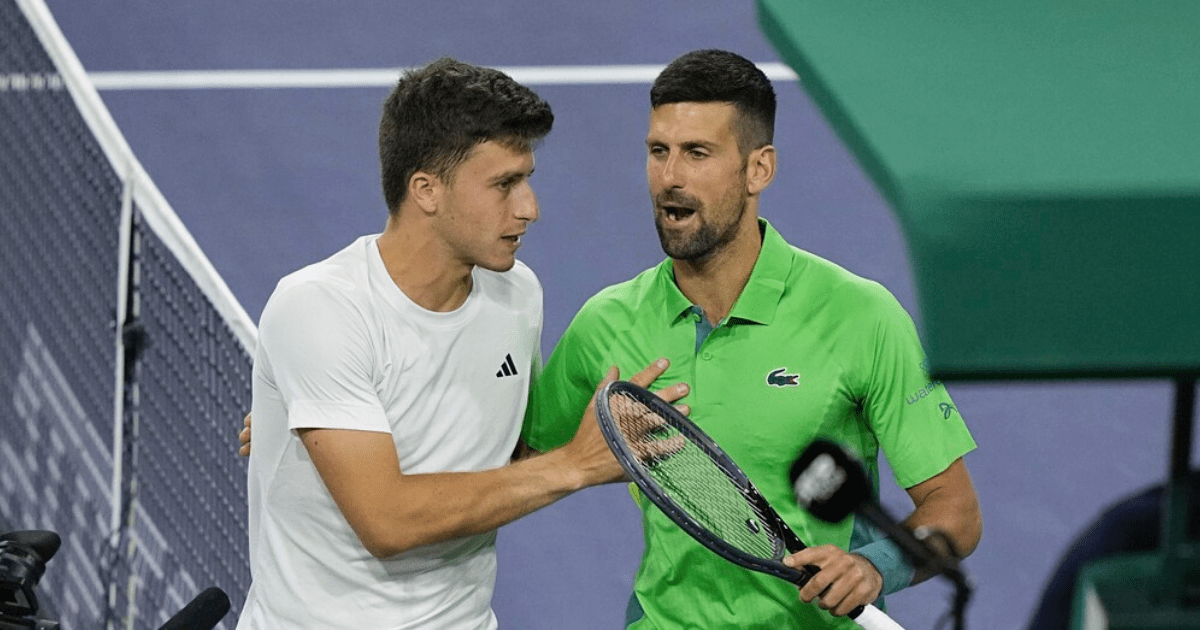Italian Underdog Shocks Tennis World by Beating Novak Djokovic
Italian tennis player Luca Nardi caused a major upset by defeating Novak Djokovic in the third round of the Indian Wells Open. Despite being a lucky loser in the tournament, Nardi managed to outplay the world No.1 and 24-time Grand Slam champion in a thrilling match.
From Idolizing Djokovic to Defeating Him
Nardi, ranked No.123 in the world, grew up idolizing Djokovic and even has a poster of the tennis legend on his bedroom door. The 20-year-old's dream came true as he defeated his childhood idol in a stunning performance, making him the lowest-ranked player to beat Djokovic in an ATP Masters 1000 event.
Post-Match Reactions and Future Plans
After the match, Nardi expressed his disbelief and excitement at the victory, stating that beating Djokovic was a dream come true. Despite his passion for tennis, Nardi also dreams of becoming a physiotherapist outside of the sport.
Djokovic's Response and Moving Forward
Following his unexpected defeat, Djokovic acknowledged Nardi's strong performance and admitted to having a bad day on the court. Despite the loss, Djokovic commended Nardi for his victory and now looks ahead to the Miami Open.
Frequently Asked Questions
How important are mental and psychological factors in tennis training for you?
Tennis requires mental and psychological training as much as physical training. Tennis players must learn how to handle stress, focus and the emotional highs or lows that come with competition. Visualization, goal-setting and mental rehearsals can be common techniques. Sports psychologists can help athletes build resilience and develop coping mechanisms for stressful situations. They can also improve their mental game in order to match their physical ability on the court.
How important are nutrition and diet in training to become an elite tennis player?
Tennis players are no different. Nutrition and diet is vital to any athlete who wants to perform at their best. A proper diet is essential for intense training, as it helps to provide energy, promotes recovery, and reduces injury risk. Diets of elite athletes typically include a balance of carbohydrates, protein, and fats as well as essential vitamins and minerals. Another important aspect is hydration, since maintaining a good fluid balance during play is essential to avoid fatigue and maintain focus.
Is it important to compete in junior events for a tennis career?
A junior tournament is a key step to a successful tennis career. These tournaments offer young athletes the opportunity to prove their abilities against their peers and gain valuable match-experience. They can also learn to deal with the psychological demands that come with competitive play. Junior tournaments are also a great way to prepare for higher-level competitions. They can have a significant impact on a players ranking, their visibility to sponsors and coaches, and even how they develop as a person.
How can a tennis player balance school and intense training requirements?
It is difficult for tennis players to balance their academic obligations with intense training schedules. It requires excellent time management, prioritization, and often creative scheduling. Flexible academic programs and online schooling can accommodate the busy training and traveling schedules of young athletes. Support from coaches, family and educational institutions is crucial in ensuring athletes can pursue their sporting ambitions without compromising education.
What is the daily training regimen of a top player in tennis?
A top tennis player’s daily training program is rigorous and well-structured. The daily training regimen of a top tennis player is rigorous and meticulously structured. It includes many hours spent on the court, with a focus on technical drills. Players also participate in training sessions that are designed to improve strength, endurance, and agility. These sessions are complemented with flexibility and recovery exercises, such as massages, stretching, or physiotherapy. Athletes must also maintain peak performance mentally and physically by ensuring proper nutrition.
Statistics
- Nutritionists report that a tennis player’s diet should consist of about 55-60% carbohydrates, 15-20% protein, and 20-25% fats during intense training periods.
- Strength and conditioning coaches emphasize core strength, noting that an increase in core stability can improve shot accuracy by up to 43%.
- Statistical trends indicate that top tennis players usually have at least 5 people in their support team, including coaches, fitness trainers, and physiotherapists.
- Approximately 70% of a professional tennis player’s training time is devoted to developing technique and on-court strategies.
- Studies show that superior agility and speed among tennis players can reduce their reaction time by up to 30%, which is crucial during high-level matches.
External Links
tenniscompanion.org
topendsports.com
optimumtennis.net
itftennis.com
wilsontennis.com
How To
How to Maximize Your Tennis Training Schedule
Optimizing your tennis training schedule requires a careful balance of on-court practice, fitness training, match play, and rest. Start by allocating blocks of time for developing technical skills – groundstrokes, serves, volleys – and tactical understanding through situation drills. Build a strong fitness base by including sessions on speed, strength and endurance each week. To practice your skills, schedule a match at least once a weekly. Rest days should be introduced to allow for recovery after particularly intense training sessions or match play. Review and adjust your schedule periodically based upon progress and goals in order to maintain continuous development.

